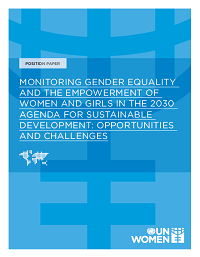UN Women position on the post-2015 development agenda
In its 2013 position paper, UN Women advocated for a stand-alone goal in the post-2015 development agenda to achieve gender equality, women’s rights and women’s empowerment, one that is grounded in human rights and tackles unequal power relations. Along with the stand-alone goal, UN Women has called for integration of gender equality concerns throughout the other priority areas and goals of the post-2015 development agenda, with clear targets and indicators.
While there has been much progress towards women’s rights over the decades, many gaps remain. For women’s rights to become a universal reality, UN Women believes that it is critical to address the structural causes of gender inequality, such as violence against women, unpaid care work, limited control over assets and property, and unequal participation in private and public decision-making. That is why we have argued that a stand-alone goal must establish minimum standards and push change forward in the three critical areas that are holding women back.
- End violence against women. One in three women is likely to experience physical and sexual violence at some point in her lifetime. The most pervasive human rights abuse in the world today, violence against women and girls is a manifestation of gender-based discrimination and a universal phenomenon which has tremendous costs for societies.
- Expand women’s choices and capabilities. Women and men need equal opportunities, resources and responsibilities. Equal access to land, credit, natural resources, education, health services (including sexual and reproductive health), decent work and equal pay needs to be addressed urgently. Policies, such as child care and parental leave as well as improved access to infrastructure (such as water and energy), are essential to reduce women’s unpaid work so that everyone can enjoy equality at work and at home.
- Give women a voice within households and in public and private decision-making spheres. For meaningful and inclusive democracy, women’s voices should be heard in decision-making and in all spheres, such as public and private institutions, national and local parliaments, media, civil society, in the management of firms, families and communities.
These elements are already included in existing international commitments such as the Convention on the Elimination of All Forms of Discrimination against Women (CEDAW) and the Beijing Platform for Action, as well as on outcomes of major conferences and resolutions of bodies such as the General Assembly and the Commission on the Status of Women.
UN Women welcomes the way gender equality has been integrated in the 2030 Agenda, which was endorsed by all UN Member States in August 2015. The 2030 Agenda offers a real opportunity to drive lasting change for women’s rights and equality, and to bring transformative change in women’s and men’s lives.
In March 2015, the United Nations Statistical Commission created an Inter-agency and Expert Group on SDG Indicators (IAEG-SDGs), tasked with developing an indicator framework for the goals and targets of the 2030 Agenda for Sustainable Development. It is composed of 28 Member States and including regional and international agencies as observers. As an observer to the Expert Group, UN Women submitted a position paper on indicators, Monitoring gender equality and the empowerment of women and girls in the 2030 Agenda for Sustainable Development: opportunities and challenges, which is the result of a wide-ranging consultation process. The Expert Group held its first meeting in June 2015 and will present its proposal on indicators for approval to the Statistical Commission at its forty-seventh session in March 2016.
Latest news
Featured publication
-
Monitoring Gender Equality and the Empowerment of Women and Girls in the 2030 Agenda for Sustainable Development
This position paper sets out UN Women’s suggestions for global indicators to effectively monitor how the SDGs are being implemented for women and girls. More
